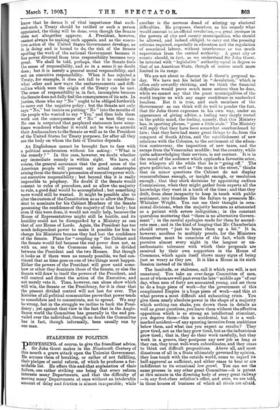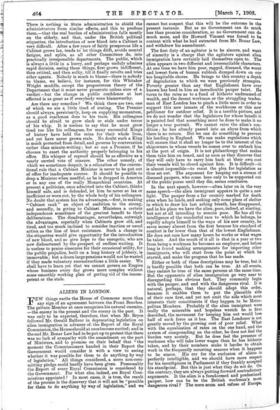STALENESS IN POLITICS.
DEOFESSING, of course, to give the friendliest advice, Sir John Gorst makes in the Nineteenth Century of this month a grave attack upon the Unionist Government. He accuses them of breaking, or rather of not fulfilling, their pledges of social reform, of which he produces a for- midable list. He offers this-and-that explanation of their failure, one rather striking one being that every reform interests many Departments, and that the difficulty of moving many Departments at once without an intolerable amount of delay and friction is almost insuperable; while another is the nervous dread of stirring up electoral difficulties. He proposes, therefore, as his remedy what would amount to an official revolution,— a great increase in the powers of city and county municipalities, who should be allowed, and. indeed obliged, to carry out the pressing reforms required, especially in education and the regulation of associated labour, without interference or too much supervision from the central authority. A great city or county should, in fact, as we understand Sir John G-orst, be invested with " legislative " authority equal in degree to that of an American State, though of course much more limited in its range.
We are not about to discuss Sir J. Gorst's proposal to- day. We have not his belief in "devolution," which is often only cowardly shirking, and we think the financial difficulties would prove much more serious than he does, while we cannot say that the great municipalities of the world inspire us with any eager confidence in unchecked localism. But it is true, and such members of the Government as can think will do well to ponder the fact, that Sir John Gorst expresses in his own way, under an appearance of giving advice, a feeling very deeply rooted in the public mind, the feeling, namely, that this Ministry has, in sporting phrase, "gone a little stale." The Ministry will reply that they have been somewhat overburdened by fate ; that they have had many great things to do, from the conquest of South Africa, and the establishment of new relations with the Colonies, to the settlement of the educa- tion controversy, the imposition of new taxes, and the escape from the Venezuelan muddle ; but the country, while quite acknowledging their services, is not content. It is in the mood of the audience which applauds a favourite actor, but whispers all the while that he is "going off." The grave politician, as well as "the man in the street," thinks that on minor questions the Cabinet do not display resourcefulness enough, or insight enough, or resolution enough ; that they shirk decisions by appointing endless Commissions, when they might gather from experts all the knowledge they want in a tenth of the time; and that they drift, from sheer incapacity to keep in touch with public sentiment, into blunders like the failure to prosecute Mr. Whitaker Wright. You can see their thought in occa- sional divisions, when the majority becomes as attenuated as a patient with severe indigestion ; in the constant querulous muttering that "there is no alternative Govern- ment " ; in the careful apologies made for them by second- rate men ; and in the kind of longing that Mr. Chamberlain should return "just to brace them up a bit." It is, however, needless to multiply proofs, for the Ministers themselves must be conscious of the fact, which they perceive almost every night in the languor or un- enthusiastic tolerance with which their proposals are received by their own supporters in the -House of Commons, which again itself shows many signs of being just as weary as they are. It is like a House in its sixth Session instead of its third.
The lassitude, or staleness, call it which you will, is not unnatural. You take an over-large Committee of men, most of whom are well past even the late" middle age" of our day, when men of forty are accounted young, and. set them to do a huge piece of work—for the government of this complicated Empire is a huge piece of work—and this at what proves a most difficult and exhausting crisis. You give them nearly absolute power in the shape of a majority which nothing can shake, you drown them in details as well as great questions, you leave them without the effective opposition which is so strong an intellectual stimulant, you deprive them—this is accidental, but it is a well- marked accident—of any spurring incentive from ambitions below them, and what can you expect as results ? They grow tired, not as the lazy grow tired, but as the industrious grow tired; that is, they do their work carefully, but they work in a groove, they postpone any new job as long as they can, they trust well-worn subordinates, and they cease to think out difficult propositions. Above all, and most disastrous of all in a State ultimately governed by opinion, they lose touch with the outside world, come to regard its half-approval as sufficient, and either cease to hear or are indifferent to its occasional low growl. You can see the same process in any other great Committee—it is patent at this minute in the directing body of every great railway —in any first-class solicitor's office, and even, we are told, in those houses of business of which all rivals are afraid. There is nothing in State administration to shield the administrators from similar effects, and this to produce them,—that the real burden of administration falls mostly on the elderly, and that, under the British political etiquettes, the introduction of new blood into a Cabinet is very difficult. After a few years of fairly prosperous life a Cabinet grows lax, tends to let things drift, avoids mental fatigue, and splits, as all other Committees do, into practically irresponsible departments. The public, which is always a little in a hurry, and perhaps unduly admires rapid decision, seeing these things, first grows indifferent, then critical, and then sulky, till it finally revolts and tries other agents. Nobody is much to blame—there is nobody to blame, we believe, for instance, for this Whitaker Wright muddle, except the preposterous theory of the Department that it must never prosecute unless sure of a verdict—but the change in public confidence at last effected is as great as if everybody were blameworthy.
Are there any remedies ? We think there are two, one of which we are a little tired. of stating. The Premier should always, persistently, keep on supplying momentum, as a good coachman does to his team. His colleagues should be afraid to grow slack or stale under terror of his whip. It is useless to say that he must grow tired too like his colleagues, for many successful Kings of history have held the reins for their whole lives, and yet have never grown stale. No doubt such a King is much protected from detail, and governs by conversation rather than minute-writing; but so can a Premier, if he chooses to exert the authority properly belonging to his office. His whisper of reproof should be as effective as a nearly carried vote of censure. The other remedy, of which we sometimes despair, is a relaxation of the conven- tional rule that a Cabinet Minister is never to be put out of office for inadequate success. It should be possible to i drop a Minister when needful, as he is dropped n America or in any one of the really Monarchical countries. At present a politician, once admitted into the Cabinet, thinks himself safe, and is defended, let him be never so lax or inefficient or worn out, by the whole body of his colleagues. No doubt that system has its advantages,—first, in making "Cabinet rank" an object of ambition to the strong, and secondly, in giving to Cabinet Ministers a certain independence sometimes of the greatest benefit to their deliberations. The disadvantages, nevertheless, outweigh the advantages, especially when Cabinets grow old, and tired, and too much inclined to consider inaction or usual action as the line of least resistance. Such a change in the etiquettes would give opportunity for the introduction of new blood, and so give hope to the energetic, who are now disheartened by the prospect of endless waiting. It is useless to praise sinecures for their occasional utility, for the public prejudice, built on a long history of jobbery, is immovable ; but a dozen large pensions would not be wasted if they made voluntary reconstructions a little easier. We shall have to learn yet that we cannot govern an Empire whose business every day grows more complex without some smoothly working plan of getting rid of the incom- petent or the stale.











































 Previous page
Previous page